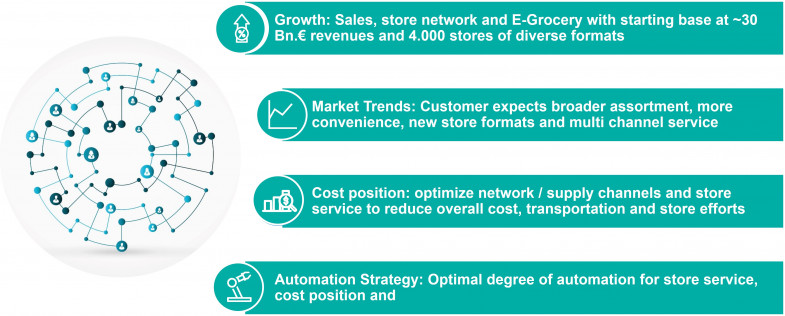

27.03.2025
Business Challenge
A leading food retailer with a revenue base of approximately €30 billion and a network of 4,000 stores faced the challenge of aligning its supply chain with evolving market demands. The company needed to extend capacities, optimize cost structures, and enhance service offerings to meet shifting customer expectations. These included demands for a broader assortment, increased convenience, new store formats, and a robust multi-channel service.

Image: Growing food retailer needed to extend capacities, optimize cost position and adapt to market trends and changing customer requirements
The primary challenge was to optimize the supply chain network and store services to achieve cost reductions, particularly in transportation and in-store operations. Additionally, the retailer needed to determine the optimal level of automation to align with ongoing market trends, ensuring future-readiness of their operations.'
Solution Delivered
Objectives
The retailer's specific objectives included optimizing the future supply chain network design and establishing a forward-looking automation strategy. The focus was on creating a scalable and adaptable model that could meet both current and future demands.
Strategy
Miebach implemented a holistic, structured logistics network planning and optimization strategy, involving all relevant stakeholders from the outset. This comprehensive approach included the development of supply chain network and automation toolboxes, supported by an intuitive user interface to facilitate practical application across the organization.
The starting point for the developed strategy was to get all key stakeholders on the same page – including stores, sales, category management, procurement, and supply chain departments – across various regions and functions. This alignment was crucial in establishing a unified vision for the retailer's future operations. It also enabled the application of mass data analytics, which provided a solid foundation for planning and forecasting.
One of the important elements of the strategy was the integration of automation strategies within the broader network optimization. This approach allowed the retailer to adapt flexibly to existing network structures and potential capacities, tailored to different product assortments.
Implementation
The implementation phase involved several steps:
Benefits
Lessons Learned & Recommendations
The broad integration of functions across regions was critical for accurate forecasting and ensuring full buy-in from all stakeholders. This approach was instrumental in the project's success and provided a solid foundation for future initiatives.
For similar future projects, we recommended to maintain a holistic and integrated approach, ensuring alignment among all stakeholders from the start. Strategies should remain flexible to adapt to both current and potential future capacities, in order to safeguard the scalability and sustainability of the supply chain network.
Andreas Hartwig, Director, Miebach:
The success of this project underscores the importance of stakeholder alignment and data-driven planning. Our approach not only addressed the immediate challenges but also laid a strong foundation for future growth and scalability."
Contact
